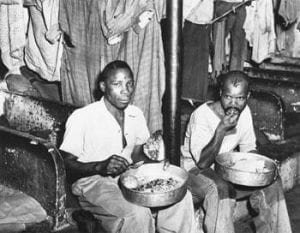Systematic racism is the basis of every aspect of the USA and the food system has no exception. In the 1600s, the first enslaved people were brought from Africa to America and were forced into labor. This included working on sugar, cotton, rice, and tobacco plantations. This brought on a sense of superiority to the white Americans, seeing anyone who is different from them as less than. The exploitation of many people of color were used to keep the social hierarchy going and it kept money in the white man’s pocket. This past of the United States has helped create the racist laws, actions, and institutions that are here today.
Now that forced labor is seen as immoral, even though it is still happening in the present, people have found a more covert way of keeping people of color oppressed. This is shown through wage gaps, the job market, the housing market, and so much more. A majority of minorities cannot find good-paying jobs with the only reason being simply that they are not white. Because of that, they find themselves working in factories, farms, and other jobs seen as undesirable and underpaying. This means that all the food being put on people’s tables are most likely being harvested or packed by people of color. While they are doing all of the hard labor, it is usually the white people that are in charge, gaining massive amounts of wealth.
Because of the unjust treatment of minorities, it makes it more difficult for them to support their families. It is harder to buy basic necessities, which can lead to a multitude of problems. This cycle continues on through generations because nothing is there to pass on to their children. However, most white people have the privilege and wealth to live healthy and have opportunities to pass onto generations of their families.
Racism and oppression are at the very base of what America was built upon. With that, the food system cannot be ignored in this equation. It is often looked upon as a basic process of the way it gets to your fridges and pantries, but it is not that simple.









